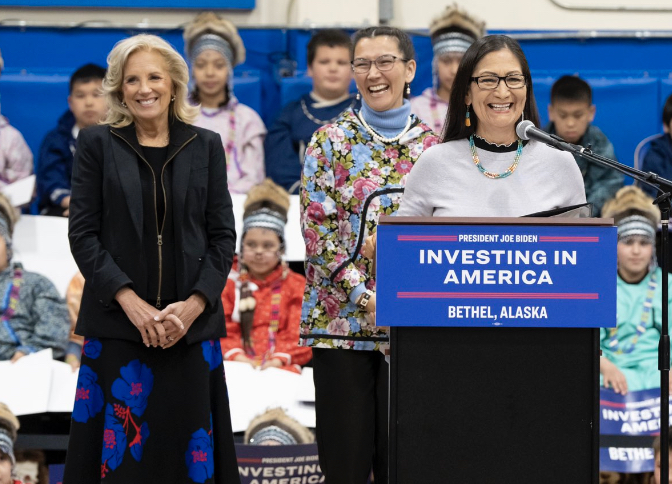
- Details
- By Levi Rickert
First Lady Dr. Jill Biden made a stop in Bethel, Alaska on her way to the G-7 Summit in Japan to meet up with her husband, President Joe Biden on Wednesday. Flying with the first lady was U.S. Department of the Interior Secretary Deb Haaland (Laguna Pueblo).
They were greeted by Rep. Mary Petola (D-AK), who is the first Alaska Native ever elected to Congress, and other local Alaska Native officials.
Dr. Biden and Secretary Haaland were there to highlight the Biden-Harris Administration's historic investments to expand broadband connectivity in Alaska, including Alaska Native communities in Alaska’s Yukon-Kuskokwim Delta.
During her remarks First Lady Biden praised Haaland’s ongoing work to protect the environment and her work with tribes across Indian Country.
Dr. Biden then touted her husband’s administration dedication to get high-speed broadband to all Americans. She talked about the bipartisan Infrastructure Act that will invest over $100 million into the Yukon-Kuskokwim Delta and even in other parts of Alaska.
"The funding is going directly to Bethel Native Corporation because you know what your communities need, and I love the name that you've chosen for it," Dr. Biden said. "An Airraq isn't the story itself. It's a tool that helps us tell it. A simple string that becomes a thing of beauty with the creativity and joy and hope we bring to it. The connections of this community are already deep. But with Airraq, you will be able to bring them to life in new ways."
She said the investment is one of the largest tribal broadband expansions in the country.
“With high-speed internet, you’ll have better access to critical health care, new educational tools, and remote job opportunities. It will change lives. It will save lives. And it will help make our world a little brighter, a little more beautiful,” Biden said.
Located in the southwest corner of Alaska, Bethel still lacks high-speed fiber connection. Currently, residents and businesses there rely on microwave transmitters on over 100 towers. The service is expensive and slow. Large files, such as medical records, are difficult to download.
More Stories Like This
Native News Weekly (August 25, 2024): D.C. BriefsUS Presidents in Their Own Words Concerning American Indians
Navajo Mother Welcomes Federal Charges in 2020 Killing of Her Son
Native News Online Launches Year-End Campaign to Support ‘Warrior Journalism’
Native News Online’s Year-End Live Stream - Recap of 2025: A Night That Brings Indian Country Together
Help us defend tribal sovereignty.
At Native News Online, our mission is rooted in telling the stories that strengthen sovereignty and uplift Indigenous voices — not just at year’s end, but every single day.
Because of your generosity last year, we were able to keep our reporters on the ground in tribal communities, at national gatherings and in the halls of Congress — covering the issues that matter most to Indian Country: sovereignty, culture, education, health and economic opportunity.
That support sustained us through a tough year in 2025. Now, as we look to the year ahead, we need your help right now to ensure warrior journalism remains strong — reporting that defends tribal sovereignty, amplifies Native truth, and holds power accountable.
 The stakes couldn't be higher. Your support keeps Native voices heard, Native stories told and Native sovereignty defended.
The stakes couldn't be higher. Your support keeps Native voices heard, Native stories told and Native sovereignty defended.
Stand with Warrior Journalism today.
Levi Rickert (Potawatomi), Editor & Publisher


